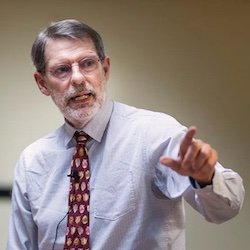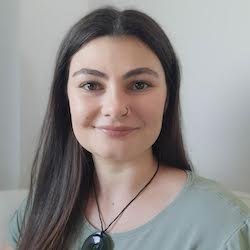The Amazon has been imagined as a pristine wilderness, one in need of protection from development. This framing has often treated the Amazon as a place without history, practically untouched before the arrival of colonizers in South America. Statistics is helping show the history is much more complicated than that and it’s the focus of this episode of Stats and Stories with guest Dani Gamerman.
More than 15 years ago, Thomas Friedman wrote, “I prefer the term “global weirding,” because that is what actually happens as global temperatures rise and the climate changes. The weather gets weird. The hots are expected to get hotter, the wets wetter, the dries drier and the most violent storms more numerous.” Today’s Stats+Stories episode will be a conversation about how a small shift in temperatures can lead to large changes in extreme weather events with guest Brett Falk.
The blue ice giants in our outer solar system have unusual magnetic fields, missing what we understand as traditional north-south poles. For decades, scientists have been trying to understand why while also puzzling out what the planets are made of under their atmospheres. Some have suggested the planets may experience diamond rain others that their mantles consist of a mix of slushy water and ammonia. A new study has suggested the planets’ have layered interiors that generate their magnetic fields. The secret lives of ice giants are the focus of this episode of Stats and Stories,
Trees have long been imagined as the earth’s lungs inhaling carbon dioxide and exhaling the oxygen needed to support life. That life, too, is important for sustaining the earth. One scholar suggests that the animals that fill the planet’s landscapes serve as earth’s heart and arteries without them, the earth would be little more than a barren rock.
Would you be surprised if a wombat won a statistical achievement award? well our guest Noel Cressie is here to talk about the WOllongong Methodology for Bayesian Assimilation of Trace-gases and how it can impact the environmental landscape.
It's been 70 years since Edmund Hillary and Tenzing Norgay summited Mount Everest. Since then hundreds of people attempt to climb the mountain each year. Many of those climbers are injured during their attempts. And during the 2023 climbing season 17 people died. Preparing for Everest takes years of training. Though there's disagreement among mountaineers about how to best prepare for the climb, statistics might be able to help and that's the focus of this episode of Stats and Stories with guest Moinak Bhaduri
14 percent of the world’s coral has been lost since 2009, according to a report from the Global Coral Reef Monitoring Network. The loss of these reefs impacts the ocean environment. Coral Reefs support almost 30 percent of marine life as well as the world economy. The plight of coral reefs is the subject of the documentary Chase Coral who’s lead scientist we have joining us today Dr. James Porter.
While Edgar Alan Poe reported that the raven quoth, “nevermore,” crow’s may respond with, “more likely” when forced to chose between two options. That’s according to our guest on this episode of Stats+Stories Dr. Melissa Johnston
Three billion, that’s how many birds the United States and Canada have lost since 1970. That decline shows up among threatened species as well as among birds we might find in our backyards like sparrows or woodpeckers. One way scientists track the size and health of bird populations is through bird banding and that’s the focus of this episode of Stats and Stories with guest Dave Russell
As we prepare to mark Earth Day 2023, many of us are also coming to terms with the latest climate report from the IPCC which said the world is on the brink of catastrophic warming. News like that can make it hard for individuals to know what they can do to have an impact on the environment. One movement suggests we can all help with conservation efforts by planting local that’s the focus of this episode of Stats and Stories with guest Doug Tallamy.
Residents of East Palestine, Ohio continue to worry about the health of their community after a Norfolk Southern train derailment. The train was carrying toxic chemicals and the Ohio Department of Natural Resources says more than 45,000 Animals have died as a result of the derailment. Residents are concerned that chemicals that leaked from the train and that entered the atmosphere as a result of a derailment related fire have made their land and their water unsafe. Ohio authorities though say East Palestine water is safe to drink. news coverage of the crisis is the focus of this episode of Stats+Stories.
With each new wildfire season comes talk that the new season is worse than the last. With recent fires raging in the western u.s., the Australian bush, the Taiga of Siberia, and the forests of France. Many point to climate change as a cause of extreme fires, and scientists are creating more specificated ways of examining that relationship. That is the focus of this episode of Stats+Stories with guest Dr. Jessica McCarty.
Earth day was launched in 1970 in the aftermath of several environmental disasters in the publication of Rachel Carson Silent Spring. It was designed to help raise awareness of environmental issues and has since grown into a global event. With this year's Earth Day taking out a particular urgency in light of the most recent UN Climate Report. But what goes into the scientific research that informs some this activism? What statistical tools are used to better understand the health of our environment. That's the focus of this episode of staffs and stories with guest Philip Dixon.
The health of the world's oceans is a growing concern but measuring ocean health is a complicated undertaking. Some people studying the issue focus on pollution, while others look at the health of corals or marine mammals. One project attempts to take a comprehensive picture of the health of oceans in order to provide information about Oceanic vital signs to stakeholders. The Ocean Health Index is the focus of this episode of Stats+Stories with guests Lelys Bravo and Julia Stewart Lowndes.
The universe seems unbelievably vast, a sky filled with countless stars and worlds. Well, maybe not so countless as there’s a whole field devoted to crunching the numbers associated with an ever-expanding universe. Astrostatistics is the focus of this episode of Stats and Stories
Amalia Bastos is a biologist and photographer who is currently a Ph.D candidate at The University of Auckland. She is part of the Animal Minds lab and work with three different species: dogs, kea, and New Caledonian crows. Her main interest is on how evolutionary pressures have shaped the minds of different species. Her PhD thesis focuses on the signature-testing approach, which aims to identify which cognitive processes animals use to understand their environment.
Roland Geyer is Professor at UCSB’s Bren School of Environmental Science and Management. Prior to joining the Bren School he held research positions in Germany, France, and the UK. Since 2000 he has worked with a wide range of governmental organization, trade associations, and companies on environmental sustainability issues. Roland has won multiple awards for his work, such as the International Statistic of the Year, and been featured widely in the media, like CBS 60 Minutes, CBS Sunday Morning, and PBS News Hour. He has a graduate degree in physics and a PhD in engineering. Learn more about Roland and his work on his website.
Dan Cooley is a Professor or Statistics at Colorado State University and is a past member and chair of the ASA’s Advisory Committee on Climate Change Policy. Dan’s research is primarily focuses on developing statistical methods for the study of extreme values and is largely motivated by problems in atmospheric science.
Dr. Michael F. Wehner is a senior staff scientist in the Computational Research Division at the Lawrence Berkeley National Laboratory. Dr. Wehner’s current research concerns the behavior of extreme weather events in a changing climate, especially heat waves, intense precipitation, drought and tropical
Dr. Caitlin Kontgis is a technical lead on the Applied Science team at Descartes Labs and was honored at the New Mexico Tech Council’s Women in Tech celebration in March 2018. Since moving to Santa Fe, Caitlin began volunteering at the local Girls Inc chapter and joined the board in fall of 2017. She is passionate about supporting women in STEM fields and scientific literacy. When not at work, you can find Caitlin running, skiing, and hiking the Sangre de Cristo Mountains
Kathyrn Miles ( @Kathryn_Miles ) is a journalist, Writer-in-residence at Green Mountain College and author of QUAKELAND: ON THE ROAD TO AMERICA'S NEXT DEVASTATING EARTHQUAKE and SUPERSTORM.
Kerrie Mengersen (@KerrieMengersen) is Distinguished Professor at the Queensland University of Technology in Brisbane, Queensland, Australia, and past-President of the International Society for Bayesian Analysis (ISBA) . Her research spans Bayesian statistics, computational statistics, environmental, genetic and health statistics.
Peter Guttorp (@pgseattle) is a Professor at the Norwegian Computing Center in Oslo, Norway, and Professor Emeritus at the University of Washington, Seattle. He is also a vice-president of the International Statistical Institute . His research focuses on stochastic models of scientific data and their statistical analysis. He has worked in seismology, hydrology, climatology, hematology and biology.
Linda J. Young is Chief Mathematical Statistician and Director of Research and Development of USDA's National Agricultural Statistics Service . She oversees efforts to continually improve the methodology underpinning the Agency's collection and dissemination of data on every facet of U.S. agriculture. She works on the surveys designed to characterize agricultural activity in the US.
Linda J. Young is Chief Mathematical Statistician and Director of Research and Development of USDA's National Agricultural Statistics Service . She oversees efforts to continually improve the methodology underpinning the Agency's collection and dissemination of data on every facet of U.S. agriculture. She works on the surveys designed to characterize agricultural activity in the US.
Barry Nussbaum (@StatisticsBarry ) is former Chief Statistician at the US EPA, and is president-elect of the American Statistical Association. Included among his many accomplishments at the EPA was providing leadership to the agency effort to remove lead from gasoline
Jim Oris is Associate Provost for Research, Dean of the Graduate School, and University Distinguished Professor of Biologyat Miami University (Ohio). Jim has spent the last 36 years exploring the effects of fossil fuels and their combustion products in freshwater and marine ecosystems. He joined the Stats + Stories regulars to discuss Earth Day and environmental issues related to oil spills and climate change


























